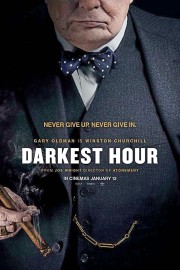Darkest Hour
Walking into Joe Wright’s “Darkest Hour,” I didn’t really expect to start thinking about Christopher Nolan’s “Dunkirk,” from earlier this year. However, it’s not an indictment of Wright’s film that I did so, as it’s basically a coincidence that the two would be significant Oscar players in the same year. Further, it feels like satisfying irony that “Darkest Hour,” which takes place in the first month of Winston Churchill being Prime Minister of England, would have, as its climax, the cornering of the British troops at Dunkirk that Nolan so intriguingly staged in his film, as a significant point in its story about how Churchill found himself struggling with his responsibilities as Britain’s stood at the precipice of Nazi invasion in 1940. If you want to keep your film references within the context of Wright’s films, though, the standoff at Dunkirk played a key role in his 2007, “Atonement,” as well, but that was at the service of a very different story set at that time. “Dunkirk” is more fitting a companion to Wright’s newest film.
By being set within the span of a month- timed out with the days changing in big lettering that takes up the screen- the screenplay by Anthony McCarten is borrowing from the structure of Spielberg’s “Lincoln,” which was also about a leader at a key point in the nation he’s leading’s history. That is a pretty natural structure, I think, because, with the right story, it turns a microscopic time frame in an individual’s life into a fascinating study on how that individual reacts when his back against that wall. This is catnip for actors, and though I wouldn’t put his work here on quite the same level I do Daniel Day Lewis’s work in “Lincoln,” Gary Oldman has done some of the best work of his career by the end of this film as Winston Churchill. Like Lincoln, he is a polarizing leader who has found himself at a moment of great division, at least politically, in his country. The previous PM, Neville Chamberlain (Ronald Pickup), is thrown out due to Parlimentary lack of confidence in his leadership during wartime, but Churchill is not a beloved savior. If anything, he is a scapegoat for compromise between the two parties. While many want to discuss peace with Germany, Churchill- who recognized the threat of Hitler and fascism early on- is someone prepared for the sacrifices war will require; however, it was his disastrous handling of the Battle of Gallipoli during WWI that has sown seeds of uncertainty around him. As the British army appears on the brink of slaughter as Belgium and France surrender, and they are driven to Dunkirk, Churchill finds the desires of those around him at odds with his traditional train of thought, and like their army, his back is against the wall.
“Darkest Hour” starts off as a very dry and predictable period drama with Oscar aspirations, and, I’m not going to lie, the makeup Oldman wears as Churchill does not help matters any. However, as the film went on, as clarity began to come through in Wright’s film, I found myself fully engaged by the story he and McCarten were telling, with the score by his frequent collaborator, Dario Marianelli, building to greater and greater tension to a thrilling swell of energy and triumph, at the end; it’s nowhere near his work in “Atonement” or “Anna Karenina” for Wright, but it’s still pretty dang good film music from someone I greatly admire. In addition to Oldman (whose work, like the film, starts off dry and gets more engaging as the film continues), the work done by Lily James, as Churchill’s personal typist when he’s working on speeches, and Ben Mendelsohn as King George VI, whose arc with Churchill is one of the reasons the film works, is sterling and serves as genuine support of Oldman’s star performance. Oldman is in line to win his first Oscar for this film, and if he does, I’ll look at it as payback for the great work he was ignored for. That being said, there is a moment where Churchill takes the underground train to Westminster, and he talks to his countrymen about their thoughts on war, where the full force of Oldman’s strengths as an actor shines through, and ironically, it’s one of the quietest, more poignant moments he’s ever acted on-screen. In that moment, “Darkest Hour” shines brightest, and I couldn’t help but be moved by where it took me.










